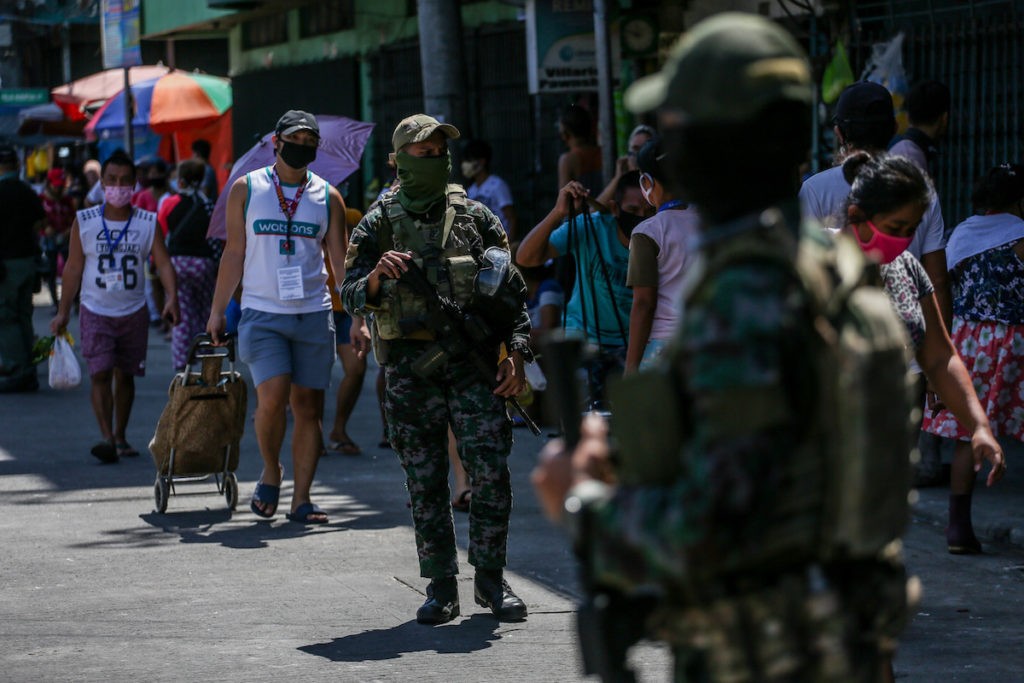Is it reasonable and appropriate for the entire Philippines to be put under martial law akin to what happened in the 1970s under the Marcos regime simply because a handful of citizens chafing under restrictions in place under an enhanced community quarantine or lockdown due to the COVID-19 pandemic violated curfew and ventured out in the streets to buy food and other daily needs?
We raise this question in light of the recent threat of President Rodrigo Duterte to call on the Armed Forces of the Philippines to prepare for enforcement of a nationwide lockdown after authorities noticed a slight buildup of vehicular traffic along a vital road artery in Metro Manila and an increase in the number of those arrested and detained for curfew violations.
If Duterte’s threat materializes and he deploys the military and its 150,000 manpower complement armed to the teeth in every street corner in Metro Manila and elsewhere, his move would be a blatant violation of the 1987 Constitution as martial law can be declared only when there is widespread lawless violence, invasion or rebellion.
A handful of citizens exercising their right to feed their families and to keep body and soul together amid the stifling atmosphere of total lockdown of communities to deal with the deadly threat of the coronavirus does not look like lawless violence or rebellion at all.
We reiterate: A martial law declaration to deal with a few restive citizens already reeling from hunger due to loss of jobs and livelihood from the blanket lockdown of communities to deal with what is mainly a public health emergency is an abomination. It would be outright repression of civil and political rights as well as economic and social rights recognized by the United Nations and our own laws.
What the government should be doing instead should be to loosen tight restrictions on mobility by emphasizing social distancing, and expanding the coverage of testing of suspected and probable coronavirus carriers. At the same time, it should give food and cash assistance to poor families.
The police and the military should be the protectors of the people, as the Constitution mandates. In a public health emergency, they should be helping health authorities build more isolation facilities, bringing medical front-liners to their places of work amid the ban on all forms of public transportation, and similar moves aimed at directly controlling COVID-19.

The last thing we want to see are soldiers reinforced by tanks and armored personnel carriers enforcing curfew and arresting and detaining those who violate lockdown protocols. Curfew violators are not criminals in the first place. If they should be penalized, it should be within the bounds of the law.
We do not need martial law, whether of the de facto or actual kind, both of which are tantamount to burning down the whole house just to get rid of a few unwanted rodents.
It’s disturbing to read news reports that the Armed Forces of the Philippines has confirmed the existence of an internal memo to the Philippine Air Force, where it described a “martial law-type role” for the members of the military and police in enforcing the Luzon-wide lockdown.
According to data from the Philippine National Police as of April 18, a total of 126,302 violators of the lockdown were either fined, apprehended, or warned.
That’s nearly 130,000 more people arrested and presumably clamped in already overcrowded jails filled with alleged drug suspects and hardened criminals such as kidnappers, murderers and rapists.
We do not dispute that the fight against COVID-19 is a life-and-death situation requiring all-out efforts by the government to contain its spread. But you don’t control an infectious disease by deploying fully-armed soldiers and police out in the streets and in communities, you give allow health authorities full authority to dictate the terms of the engagement, not the military and police officials following orders from above.
The net effect of such demonstration of the coercive power of the state will not be reassuring at all to the citizenry. On the contrary, it only compounds the very real danger to human lives posed by COVID-19, and reinforces the fear that our already fragile democracy can be torn to shreds once again under the guise of fighting a deadly virus.
Ernesto M. Hilario writes on political and social justice issues for various publications in the Philippines. The views and opinions expressed in this article are those of the author and do not necessarily reflect the official editorial position of LiCAS.news.